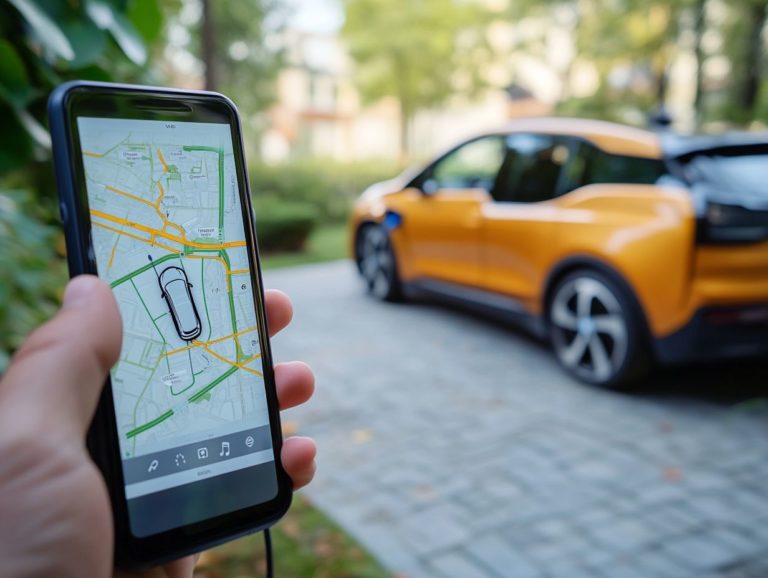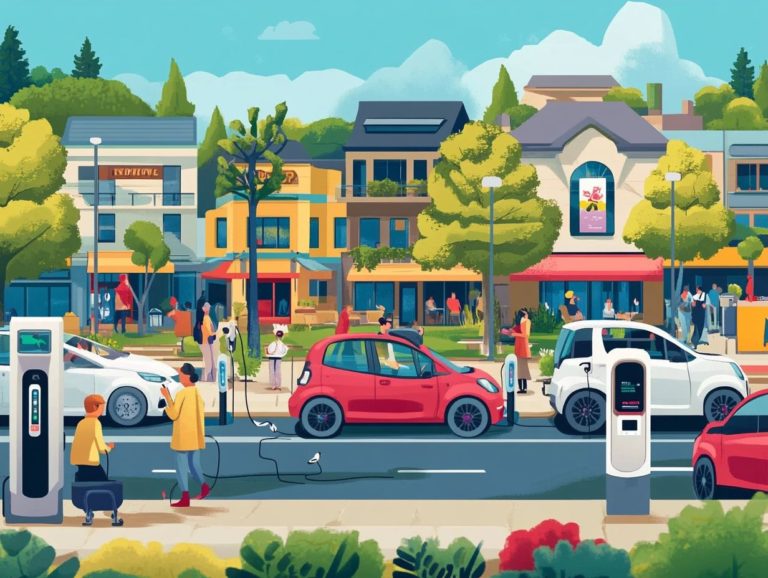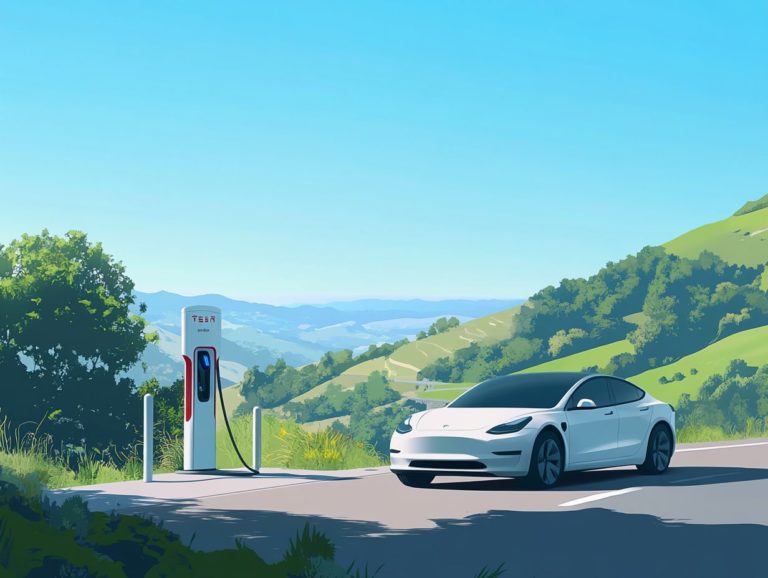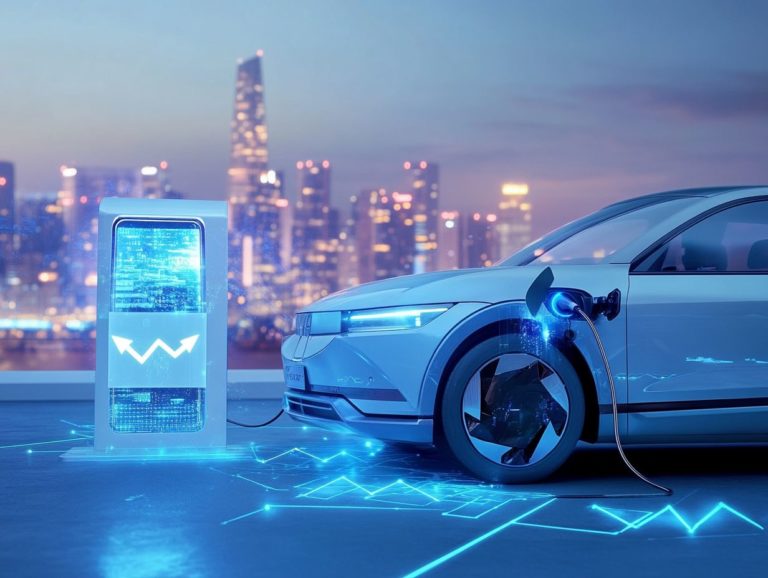What Are the Environmental Benefits of EVs?
Electric vehicles (EVs) are changing how we think about transportation and its impact on our planet. In this article, we ll explore the incredible benefits of EVs and how they re leading the charge against climate change.
We must also recognize the challenges that accompany this transition, such as infrastructure limitations and affordability concerns. You ll gain insights into the future of EVs, exploring their potential for further advancements in establishing a sustainable transportation system.
Let s dive in and explore these exciting topics!
Contents
Key Takeaways:
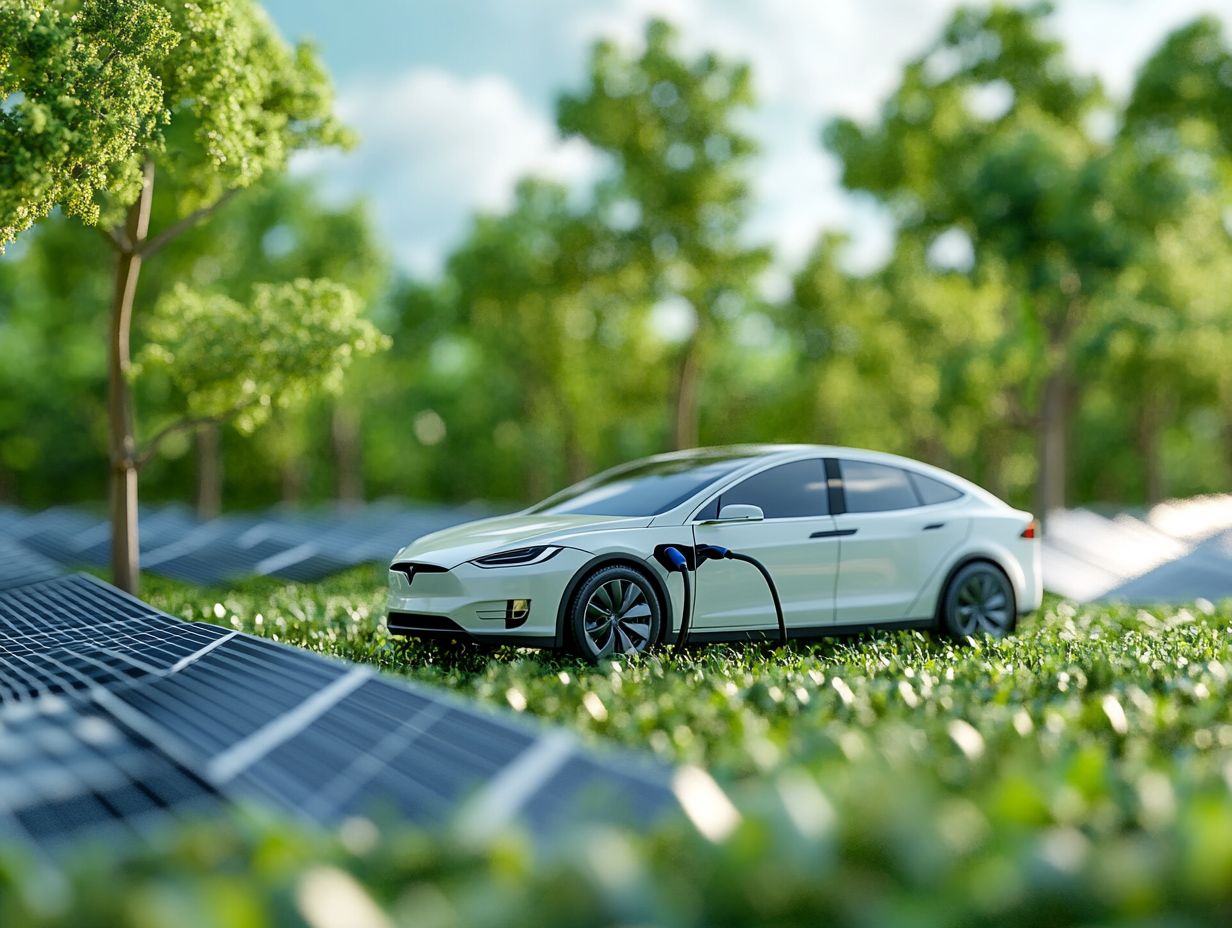
- EVs reduce emissions and pollution, making them more environmentally friendly than traditional vehicles.
- EVs play a significant role in mitigating the effects of climate change by emitting less greenhouse gases and pollutants.
- Despite challenges, the potential improvements in EV technology are crucial for a greener future.
What are EVs and How Do They Work?
Electric vehicles (EVs) mark a transformative shift in the transportation sector. They harness advanced technology to power vehicles with electricity instead of traditional gasoline.
These zero-emission vehicles not only aid in achieving carbon neutrality but also significantly lower the environmental impact associated with conventional car manufacturing and fuel use.
By employing advanced batteries that store and provide electricity efficiently, electric cars promise enhanced battery life and efficiency. This highlights their potential for sustainable transportation and their role in combating climate change.
EVs come in various forms, including battery electric vehicles (BEVs) and hybrid electric vehicles (HEVs). Each features unique components like electric motors, regenerative braking systems, and sophisticated battery management systems.
BEVs operate solely on electric power, benefiting from innovations that extend their range and reduce charging times. In contrast, HEVs blend internal combustion engines with electric propulsion, optimizing fuel efficiency.
Ongoing advancements in smart charging technologies and energy recovery systems continually elevate EV performance. This underscores the crucial role of electric vehicles in shaping a cleaner, more efficient future for urban mobility.
Environmental Benefits of EVs
The environmental benefits of electric vehicles (EVs) are remarkable, especially in their role in combating climate change and lowering carbon emissions in the transportation sector. To learn more about this topic, check out the regulations on environmental regulations for EVs.
By embracing clean energy sources for charging, EVs facilitate a substantial reduction in greenhouse gas emissions. This amplifies the positive environmental effects of both personal and public transportation.
Reducing Emissions and Pollution
You can count on electric vehicles to play a crucial role in reducing emissions and pollution. They completely eliminate the tailpipe emissions associated with traditional gasoline-powered cars.
By running on electricity instead of fossil fuels, these vehicles significantly cut down greenhouse gas emissions, paving the way for cleaner air and a healthier environment. A study from California revealed that, on average, EVs emit about 50% fewer emissions over their lifetime compared to their conventional counterparts, even when considering the emissions from electricity generation.
In Norway, where nearly 54% of all new car sales are electric, this shift has led to an impressive 20% reduction in transportation-related carbon emissions over the past decade. This transformation underscores the effectiveness of electric vehicles and their remarkable potential to significantly enhance the environmental footprint of urban areas.
As we move forward, consider the impact of EVs on our environment. Explore options for adopting electric vehicles in your life and help drive the change towards sustainability.
Impact on Climate Change

The impact of electric vehicles on climate change is profound. They present a viable path towards carbon neutrality. By reducing reliance on fossil fuels and promoting renewable energy sources in transportation, we embrace a sustainable future.
Electric vehicles (EVs) have the remarkable potential to significantly reduce greenhouse gas emissions. Their popularity is surging worldwide, driven by international initiatives to create a cleaner and more sustainable environment. For example, the European Union has set ambitious climate goals that encourage the adoption of EVs while expanding crucial charging infrastructure.
The International Energy Agency emphasizes the need for a transition to cleaner energy systems, recognizing the pivotal role EVs play in this shift. Leading nations, including China and the United States, are investing heavily in technology, public charging networks, and subsidies. This collective effort reflects a strong commitment to combating climate change and nurturing a greener planet for everyone.
Challenges and Limitations of EVs
While electric vehicles (EVs) offer numerous advantages, significant challenges and limitations still hinder their widespread adoption, especially regarding infrastructure and affordability.
As demand for electric cars rises, a robust public charging network and effective battery recycling methods become vital for facilitating this transition.
Infrastructure and Affordability
Infrastructure and affordability are major barriers to the widespread adoption of electric vehicles. The availability of public charging and the purchase price are critical factors for consumers.
If you’re thinking about switching to electric, expanding public charging networks is essential. This expansion alleviates the fear of running out of battery before reaching a charging station and enhances overall convenience.
Innovative technologies are emerging that promise to lower manufacturing costs for electric vehicles. This makes them more accessible to a wider audience.
Consumer tax credits and incentives are pivotal in this transition. They provide the financial relief necessary to offset initial purchase costs and encourage a deeper commitment to sustainable transportation solutions.
Future of EVs and Environmental Impact
The future of electric vehicles (EVs) is incredibly exciting. Swift technological advancements and a remarkable growth trajectory highlight the importance of sustainable transportation solutions.
As innovations unfold in critical areas such as battery longevity and charging efficiency, the emissions benefits of EVs are expected to improve significantly. This solidifies their role as a cornerstone in the global initiative to combat climate change.
Potential for Further Improvements

The potential for further improvements in electric vehicles is immense, especially regarding technological innovations in battery life and efficiency. These advancements are vital for boosting overall performance and emissions benefits.
Ongoing advancements in solid-state battery technology aim to significantly increase energy density while reducing charging times. This makes electric vehicles not only more powerful but also more accessible and user-friendly.
The expansion of charging infrastructure, including ultra-fast charging stations, is essential for alleviating range anxiety for consumers. Supportive policies that provide incentives and subsidies for EV adoption are crucial. These create a more favorable market environment.
Partnerships between governments and private companies are paving the way for groundbreaking innovations, such as wireless charging systems. These could revolutionize how electric vehicles are powered.
Now is the time to embrace electric vehicles and join the movement to combat climate change!
Role in Sustainable Transportation
Electric vehicles are at the forefront of the shift towards sustainable transportation, serving as a critical solution for reducing environmental impact and promoting clean energy usage.
By adopting EVs, you re not just aiming to minimize carbon emissions. You re also contributing to a larger movement towards renewable energy sources.
Consider Norway, for example. Norway is leading the charge! With over 54% of new car sales being electric, it s a shining example of what s possible. The country has seen remarkable success by providing incentives for EV purchases.
Cities like Amsterdam are similarly changing their cities by building more charging stations and implementing low-emission zones. These initiatives highlight the significance of including electric vehicles in a clear plan for sustainable transport, ultimately fostering healthier urban landscapes and dramatically improving air quality.
Frequently Asked Questions
What Are the Environmental Benefits of EVs?
Electric vehicles (EVs) have several environmental benefits that make them a more sustainable transportation option. Some of the main benefits include reducing greenhouse gas emissions, improving air quality, and decreasing reliance on fossil fuels.
How do EVs reduce greenhouse gas emissions?
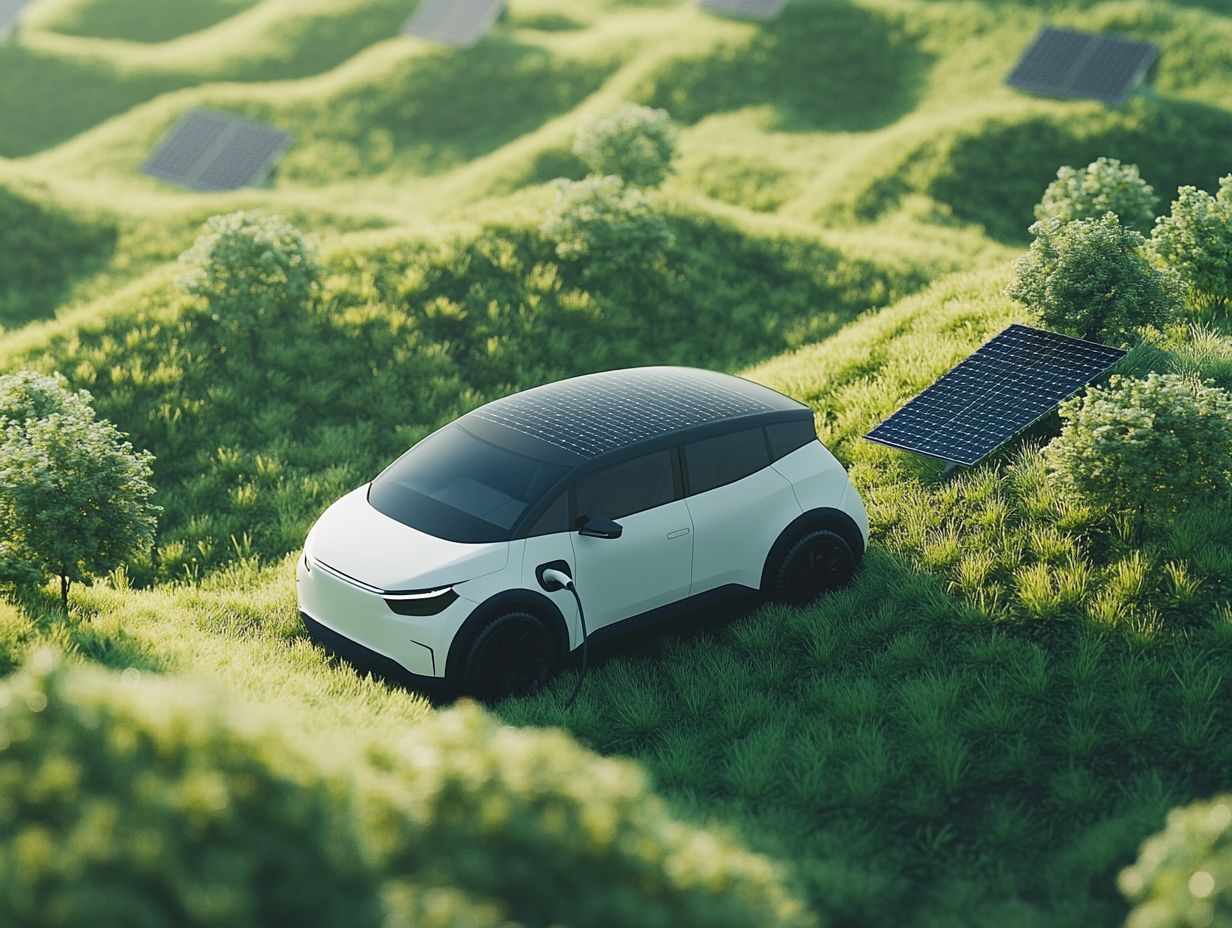
EVs run on electricity, which can be generated using renewable sources such as solar and wind power. This means that they produce little to no greenhouse gas emissions during operation, unlike traditional gasoline-powered vehicles which emit carbon dioxide and other pollutants.
Do EVs contribute to better air quality?
Yes, EVs do not emit harmful pollutants like carbon monoxide, nitrogen oxides, and particulate matter that can contribute to poor air quality and health issues. By choosing to drive an EV, you are helping to improve the air quality in your community.
How do EVs decrease reliance on fossil fuels?
EVs use electricity as their primary source of energy, which can be generated using renewable sources. This reduces our dependence on non-renewable fossil fuels like oil and gas, which are not only limited resources but also contribute to climate change and other environmental issues.
What else makes EVs an eco-friendly choice?
Beyond cutting emissions and dependence on fossil fuels, EVs also have a lower carbon footprint throughout their entire life cycle. This includes the production and disposal of the vehicle, making it a more sustainable transportation option overall.
Can EVs help mitigate the effects of climate change?
Yes, by choosing to drive an EV, you are reducing your carbon footprint and contributing to the global effort to combat climate change. As more people switch to EVs, we can reduce the amount of greenhouse gas emissions released into the atmosphere, helping to slow the effects of climate change.

